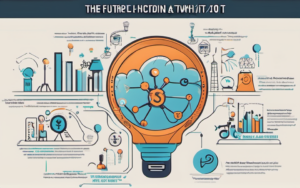The world is changing at a dizzying pace, driven by a wave of emerging technologies that are transforming industries and reshaping market dynamics. These technologies are not just incremental improvements; they are fundamentally altering how businesses operate, how consumers interact with brands, and how markets function. From artificial intelligence to blockchain, the impact of these advancements is profound and far-reaching.
The Rise of Disruptive Technologies
Emerging technologies are disrupting traditional business models and creating new opportunities. These technologies are characterized by their ability to automate tasks, analyze vast amounts of data, and connect people and devices in unprecedented ways.
Artificial Intelligence (AI) and Machine Learning
Artificial intelligence (AI) and machine learning (ML) are revolutionizing industries by automating tasks, improving decision-making, and personalizing customer experiences. AI-powered chatbots are transforming customer service, while ML algorithms are enabling businesses to predict customer behavior and personalize marketing campaigns.
Blockchain and Decentralized Systems
Blockchain technology is disrupting traditional financial systems by providing a secure and transparent platform for transactions. It enables decentralized applications (dApps) and empowers users to take control of their data. Blockchain is also transforming supply chain management, enabling increased transparency and traceability.
Internet of Things (IoT) and Connected Devices
The Internet of Things (IoT) is connecting everyday devices to the internet, creating a network of interconnected objects that can communicate and share data. This is leading to the development of smart homes, smart cities, and intelligent manufacturing systems.
Cloud Computing and Big Data Analytics
Cloud computing and big data analytics are enabling businesses to store, process, and analyze vast amounts of data. This data can be used to improve decision-making, identify trends, and personalize customer experiences.
Impact on Business Models and Operations
Emerging technologies are transforming business models and operations in significant ways. Businesses are embracing automation, focusing on personalization, and exploring new revenue streams.
Automation and Efficiency Gains
Emerging technologies are automating tasks, freeing up employees to focus on higher-value activities. This is leading to increased efficiency, reduced costs, and improved productivity. For example, robots are being used in manufacturing to perform repetitive tasks, while AI-powered software is automating customer service inquiries.
Personalized Customer Experiences
Emerging technologies are enabling businesses to personalize customer experiences by collecting and analyzing data about individual preferences. This data can be used to provide tailored recommendations, offer personalized marketing campaigns, and deliver customized services.
New Revenue Streams and Business Opportunities
Emerging technologies are creating new revenue streams and business opportunities. For example, the rise of the sharing economy has created new platforms for renting out cars, homes, and other assets. AI and ML are enabling businesses to develop new products and services that cater to specific customer needs.
Supply Chain Optimization and Transparency
Blockchain technology is revolutionizing supply chain management by providing a transparent and secure platform for tracking goods. This is enabling businesses to optimize their supply chains, reduce costs, and improve customer trust.
Shifting Consumer Behavior and Preferences
Emerging technologies are influencing consumer behavior and preferences in profound ways. Consumers are increasingly comfortable with digital interactions, demanding personalized experiences, and prioritizing transparency and trust.
Digital Natives and the Rise of E-commerce
The rise of digital natives, who grew up with the internet and mobile devices, has accelerated the growth of e-commerce. Consumers are comfortable shopping online and expect seamless digital experiences.
Demand for Convenience and On-Demand Services
Consumers are demanding convenience and on-demand services. This is leading to the growth of platforms that provide instant access to goods and services, such as ride-sharing services, food delivery apps, and streaming services.
Increased Transparency and Trust in Brands
Consumers are demanding greater transparency and trust in brands. They are increasingly aware of how their data is being used and expect brands to be ethical and sustainable in their operations.
Challenges and Opportunities for Businesses
While emerging technologies present numerous opportunities, they also pose challenges for businesses. Adapting to rapid technological change, managing data security and privacy, and developing a skilled workforce are key considerations for success.
Adapting to Rapid Technological Change
Businesses must be agile and adaptable to keep pace with rapid technological advancements. They need to continuously invest in research and development, embrace new technologies, and update their business models to remain competitive.
Managing Data Security and Privacy
Emerging technologies generate vast amounts of data, raising concerns about data security and privacy. Businesses must implement robust security measures to protect customer data and comply with data privacy regulations.
Developing a Skilled Workforce
The rapid adoption of emerging technologies requires businesses to develop a skilled workforce with the necessary technical expertise. This includes investing in employee training and development programs, recruiting talent with the right skills, and fostering a culture of innovation.
Embracing Innovation and Experimentation
Businesses must embrace innovation and experimentation to explore new opportunities and stay ahead of the competition. This involves investing in research and development, exploring new technologies, and testing new business models.
The Future of Market Dynamics
Emerging technologies will continue to reshape market dynamics, leading to hyper-personalized experiences, the rise of the sharing economy, and the increasing importance of sustainability and ethical business practices.
Hyper-Personalization and Predictive Analytics
AI and ML will enable businesses to provide hyper-personalized experiences by analyzing customer data and predicting their needs. This will create highly targeted marketing campaigns, customized product recommendations, and personalized customer service interactions.
The Rise of the Sharing Economy
The sharing economy will continue to grow, with platforms enabling consumers to share assets such as cars, homes, and other goods. This will create new business models and disrupt traditional industries.
Sustainable and Ethical Business Practices
Consumers are increasingly demanding sustainable and ethical business practices. Businesses will need to adopt environmentally friendly practices, prioritize ethical sourcing, and promote transparency in their operations.
The Importance of Collaboration and Partnerships
The rapid pace of technological change necessitates collaboration and partnerships. Businesses will need to work with technology providers, research institutions, and other companies to develop innovative solutions and adapt to emerging trends.
The future of market dynamics is being shaped by emerging technologies, creating both opportunities and challenges for businesses. By embracing innovation, adapting to change, and prioritizing sustainability and ethical practices, businesses can navigate this dynamic landscape and thrive in the years to come.




